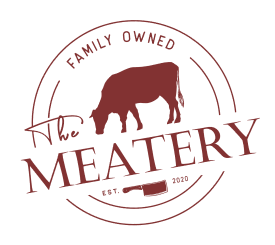What is Wagyu Beef?
Wagyu beef, renowned worldwide for its unmatched quality, originates from Japan's rich culinary history. The term "Wagyu" translates directly to "Japanese cow," highlighting its origins deeply rooted in Japanese agricultural traditions. Dating back to the late 19th century, the Japanese government embarked on a program dedicated to improving indigenous cattle breeds, aiming to achieve superior marbling, tenderness, and flavor.
Selective breeding practices focused on enhancing specific genetic traits, most notably intramuscular fat distribution, commonly known as marbling. This specialized breeding, combined with a carefully controlled diet and humane raising practices, created beef distinguished by its remarkable tenderness and buttery texture.
Over time, distinctive strains of Wagyu cattle emerged, each linked to specific regions in Japan. Notable among these strains are Kobe, Matsusaka, Miyazaki, and Yonezawa, each named after their respective regions and each known for subtly unique flavor profiles and marbling patterns.
Understanding Different Types of Wagyu Cattle
While Wagyu originally referred exclusively to cattle raised in Japan, growing international demand has led to the expansion of Wagyu cattle breeding programs globally, giving rise to distinct international varieties such as American Wagyu, Australian Wagyu, and Japanese Wagyu.
Japanese Wagyu Cattle
Japanese Wagyu cattle, including the famed Kobe and Miyazaki beef, represent the pinnacle of Wagyu quality. These cattle are strictly purebred, raised under meticulously controlled conditions that focus heavily on diet, environment, and stress management. Japan maintains rigorous standards for grading, ensuring the highest-quality meat with superior marbling and tenderness.
American Wagyu Cattle
American Wagyu is typically a crossbreed between purebred Japanese Wagyu cattle and American breeds, commonly Angus cattle. While retaining much of the prized marbling and tenderness of authentic Wagyu, American Wagyu adapts better to diverse climates and grazing conditions within the U.S. This variety is often more accessible and affordable, offering consumers a way to experience Wagyu characteristics without the high cost of pure Japanese Wagyu.
Australian Wagyu Cattle
Australian Wagyu cattle similarly result from crossbreeding Japanese Wagyu genetics with local Australian cattle breeds (however there are Fullblood Australian Waygu Cattle!) Australian Wagyu is distinguished by rigorous breeding practices that aim to balance traditional Wagyu traits with the adaptability needed for Australia's varied climates. This variety has earned global recognition for its consistent marbling, tenderness, and slightly different flavor profile due to its unique feeding methods and environmental factors.
At The Meatery, San Diego's #1 Butcher Shop, we will help you through every step to make sure we find the perfect cut based on your personal preference!
Crossbreeding and International Varieties
Crossbreeding Wagyu cattle has become widespread, allowing international farmers to blend Wagyu's prized traits with local cattle breeds adapted to regional climates. These efforts have produced cattle that maintain Wagyu’s essential qualities—impressive marbling, exceptional tenderness, and unique flavor—while being more resilient and adaptable to local environments.
These international varieties offer global consumers easier access to Wagyu beef's renowned taste and texture, often at more approachable price points compared to purebred Japanese Wagyu.
Health Benefits of Wagyu Beef
Beyond its exceptional culinary reputation, what makes wagyu beef so special is that it also offers noteworthy health benefits. Wagyu is rich in monounsaturated fats, notably oleic acid, which is associated with improved heart health, lowered cholesterol, and reduced inflammation.
Additionally, Wagyu steak contains conjugated linoleic acid (CLA), a beneficial fatty acid linked to enhanced immune function, improved weight management, and potential anticancer effects. Wagyu’s high intramuscular fat concentration also contributes to its easy digestibility and helps the body efficiently absorb essential nutrients.
While Wagyu offers these benefits, it should be enjoyed in moderation as part of a balanced diet due to its higher fat content compared to traditional beef.
What Do Wagyu Cows Eat?
A significant part of Wagyu beef’s quality is tied to the unique diets of the cattle. In Japan, Wagyu cattle diets are meticulously balanced, often including a specialized blend of grains, grasses, and supplements.
A traditional dietary component for Japanese Wagyu is fermented feed known as "beer mash" or "beer lees," a nutritious byproduct from brewing beer. Rich in fiber and nutrients, this contributes significantly to the beef’s distinctive flavor profile and unparalleled marbling.
In addition, Wagyu cows consume a mixture of grains like corn, barley, wheat, and high-quality grass or hay, all carefully managed to maximize nutrition. Stress reduction practices, such as massages and even beer feeding, further enhance meat quality by promoting a calm, healthy cattle environment.
What makes Wagyu Beef different from Regular Beef?
The primary differentiator between Wagyu beef and regular beef is the intricate marbling and unmatched tenderness of Wagyu meat. Marbling, the web of intramuscular fat, gives Wagyu beef its signature melt-in-your-mouth texture, rich flavor, and buttery tenderness.
Genetically, Wagyu cattle inherently produce significantly higher levels of intramuscular fat compared to regular beef cattle. Regular beef typically exhibits less marbling, resulting in a tougher, less juicy texture. Furthermore, regular beef cattle are usually raised under standard farming practices without the specialized diets and meticulous care that Wagyu cattle receive.
Additionally, Wagyu beef undergoes a stringent grading system, particularly in Japan, which evaluates marbling, color, and overall quality to ensure consistent excellence. This grading system guarantees an authentic Wagyu beef experience that consumers worldwide trust and value.
Conclusion
Wagyu beef remains unrivaled in the culinary world due to its extraordinary marbling, flavor, tenderness, and health advantages. Understanding the nuanced differences among various Wagyu breeds—Japanese, American, and Australian—enhances appreciation for this luxurious delicacy. Whether you're exploring pure Japanese Wagyu or enjoying more accessible international varieties, check out The Meatery for the best cuts you can find!










